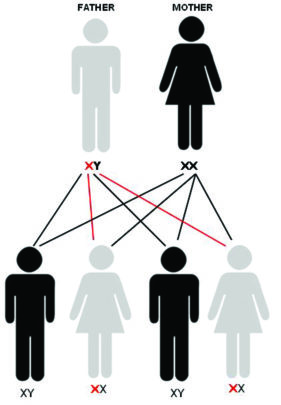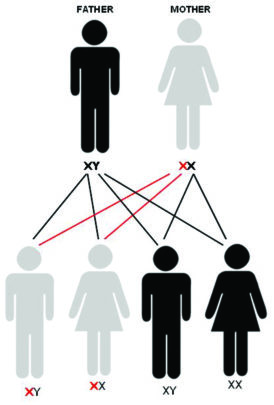Is Haemophilia Inherited?
In most cases Haemophilia is an inherited condition and is passed down through family genes.
However, it is also possible for the condition to appear in any family (known as a spontaneous mutation). It is thought that at least 30% of people with haemophilia have no family history of a bleeding disorder, though it is difficult to know exactly because of the way in which haemophilia is inherited.
How is Haemophilia Inherited?
Both Haemophilia A and B are inherited in the same way, as both factor VIII and factor IX are located on the X chromosome. The X and Y chromosomes determine if a person will be male or female. Males have an X and Y chromosome, whereas females have two X chromosomes.
If a male has an altered haemophilia gene on his X chromosome, he will be affected with haemophilia. If a female has an altered chromosome on one of her X chromosomes, she will be a carrier of haemophilia.


As demonstrated in Figure 1, when the father has haemophilia and the mother is unaffected, none of the sons will have haemophilia.
However, all daughters will be obligatory carriers, as they will inherit an X chromosome from the father, which contains the haemophilia gene.
As demonstrated in Figure 2, when the mother carries the haemophilia gene and the father is unaffected, there is a 50% chance at each birth that a son will have haemophilia. There is also a 50% chance at each birth that a daughter will carry the haemophilia gene.
What are carriers?
As stated above, carriers of haemophilia are females who inherit one affected X chromosome. They have one affected gene and one working gene, meaning that the working gene can produce factor VIII or factor IX. For this reason, many carriers will have factor levels in the normal range. However, sometimes the person’s levels can be lower than normal and they will have bleeding symptoms. These women have mild haemophilia.For this reason, many carriers will have factor levels in the normal range. However, sometimes the person’s levels can be lower than normal and they will have bleeding symptoms. These women have mild haemophilia.
Lyonisation
It is important to understand the concept of “Lyonisation”. This occurs in rare cases where the normal X chromosome in inactivated instead of the X with haemophilia. As a result, the person may now have severe haemophilia as both X chromosomes are now affected.
It is also possible for a girl to have severe haemophilia if her father is a person with haemophilia and her mother is a carrier.
